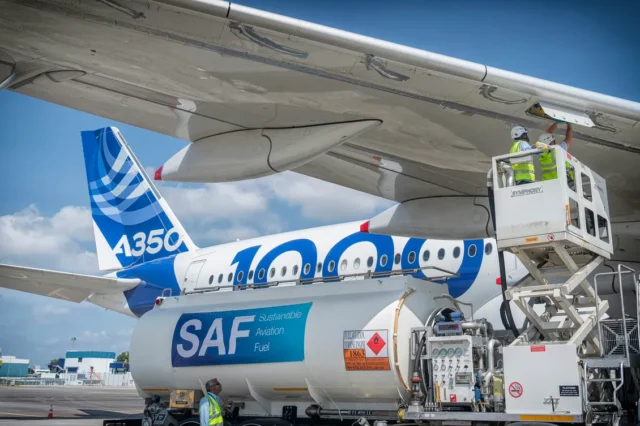WTTC-ICF Framework Calls for Travel & Tourism to Partner on Scaling Sustainable Fuel Use
Report details how hotels, airlines, cruise liners, and agencies can advance cleaner fuels.

The World Travel & Tourism Council (WTTC) and global consultancy ICF have launched a framework on May 14, 2025, aimed at significantly increasing the production and use of Sustainable Aviation Fuel (SAF) and other renewable fuels within the Travel & Tourism sector.
Scaling Up Sustainable Fuel
The report, titled Scaling Up Sustainable Fuel, sets out a roadmap for businesses of all sizes to tackle transport-related emissions and transition to cleaner fuels, WTTC states.
WTTC President & CEO Julia Simpson notes that SAF presents the greatest opportunity for decarbonisation but warns that current supply is far below demand.
“Sustainable fuel is not just an environmental necessity; it’s a business imperative,” Simpson states, calling on governments to incentivise SAF production rather than simply setting sector-wide targets.
Current Challenges in SAF Adoption
SAF currently accounts for just 0.3% of global jet fuel usage, WTTC reports.
To meet net-zero aviation targets by 2050, production must grow 400-fold, from 1.25 billion litres today to over 450 billion litres, requiring 6,500 new renewable fuel plants worldwide.
Unlike other decarbonisation solutions, SAF is a drop-in fuel, meaning it is compatible with existing aircraft, yet highproduction costs, feedstock competition, and limited infrastructure have kept volumes low and prices high—up to 10 times more expensive than conventional jet fuel, WTTC notes.
Industry Engagement & Global Impact
The framework categorises Travel & Tourism stakeholders into tiered engagement roles—Collaborators, Promoters, Adopters, or Investors—allowing businesses to contribute through campaigns, waste supply, production funding, or SAF purchases, WTTC states.
ICF Managing Director Daniel Galpin underscores SAF’s role in aviation’s future.
“The tourism ecosystem must act collectively to support sustainable fuels and meet sector-wide targets,” Galpin states.
Real-World Examples & Economic Risks
Several businesses have already moved forward with SAF adoption:
- Erawan Group is converting hotel waste oil into SAF in Asia.
- Jet2 has invested in a UK-based SAF facility using household waste.
The framework warns that government SAF mandates requiring 5-10% fuel blending by 2030 may lead to higher travel costs and reduced consumer choice unless industry collaboration increases.
With Travel & Tourism projected to generate $16.5 trillion and support 460 million jobs by 2035, WTTC states that scaling SAF production is both an environmental necessity and an economic imperative.
